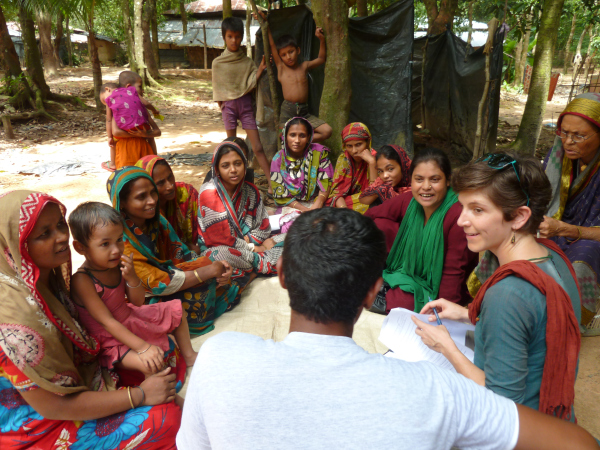
Volunteer Post
Building Awareness to Create Change in Bangladesh
Victoria Solbert, F2F Volunteer
My work with the CREL project here in Bangladesh has allowed me to visit all the top destinations of the country many do not get to see. The floodplains of the South-west region just outside the Sundarbans mangrove forest, home to the famous Bengal Tiger. The wetlands, forests, and tea plantations of Srimongol in the north east. The longest (natural) beach in the world in Cox’s Bazaar, and the beautiful Chittagong Hill Tracts where foreign visitors are required to obtain permits to enter. My work colleagues joke that they should be professional tour guides after the wonderful job they did showing me the highlights of each region, including local food, markets, cultural and natural attractions.
CREL, or the Climate-Resilient Ecosystems and Livelihoods (CREL), is a USAID project being implemented by Winrock International. The goal of the project is to “adapt successful co-management models to conserve ecosystems and protected areas, improve governance of natural resources and biodiversity, and increase resilience to climate change through improved planning and livelihoods diversification.” I came [as a volunteer under Winrock’s USAID-funded Farmer-to-Farmer program] to assist with the evaluation of CREL’s livelihood activities. These activities primarily target small farming communities living in and around protected areas, providing education on improved farming practices and building market linkages to help them increase their income.
In order to evaluate how effective initial project interventions have been, I conducted a beneficiary assessment. This used qualitative interviews with project beneficiaries to gain an understanding of how the CREL project and livelihood activities are viewed by the people they are intended to benefit. This meant I got to travel to villages in project sites around the country in order to speak with members of these remote communities.
In my conversations I was constantly amazed at how engaged and motivated project participants were. CREL is the fourth in a series of similar projects focused on improving management of protected areas and preserving Bangladesh’s unique ecosystems. These previous projects laid extensive groundwork, raising awareness among local communities around the importance of protecting these ecosystems and effectively managing resources. This base created a desire among project participants to find ways to adopt alternative livelihoods which would allow them to support themselves without relying on extraction of natural resources. The CREL project, through technical trainings, demonstration plots, and relationship building, is giving them the skills and capacity necessary to shift away from this natural resource dependency.
A majority of individuals I spoke with had readily adopted new farming practices, crops, or business opportunities. They were excited to use the skills the CREL project was teaching them. Wives believed their husbands would soon not have to go the forest anymore because they would be able to contribute to the family income through vegetable cultivation or handicraft production. Fish pond operators bragged how people walking by their ponds would stop and admire how much larger their young fish were compared to other ponds. Subsistence producers are often very risk adverse and wary of experimentation, so I was surprised by their ready willingness adopt completely new practices and crops. I do not believe participants would have been so without the relationships and awareness built over the long course of the CREL project and its predecessors.
Winrock was here for the first project nearly 20 years ago, known as MACH (Management of Aquatic Ecosystems through Community Husbandry). While CREL is intended to be the last in this USAID project series, Winrock and its local partners will be here in Bangladesh for the long haul, and plan to continue providing support and leveraging funds for additional activities. Despite the contract for CREL stating it is a 5 year project, it was extremely gratifying to learn its activities and impacts have and will extend over a much longer period of time.
